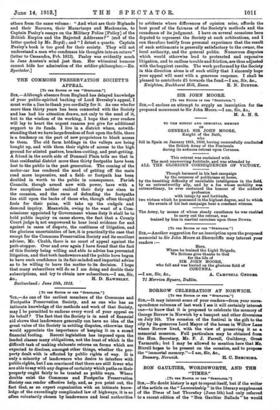THE COMMONS PRESERVATION SOCIETY'S APPEAL.
[To THE EDITOR OP THE "SPECTATOR."] Sin,—Although absence from England has delayed knowledge of your public-spirited backing of Lord Everaley's appeal, I must write a line to thank you cordially for it. As one who for more than thirty years has been connected with the Society and has had his attention drawn, not only to the need of it, but to the wisdom of its working, I hope that your readers will lay to heart the urgent reasons you give for additional support to its funds. I live in a district where, notwith- standing that we have large freedom of foot upon the fells, there is a tendency on the part of new proprietors to block access to them. The old farm holdings in the valleys are being bought up, and with them their rights of access to the high ground for stinted pasture, bracken-cutting, and peat-getting. A friend in the south side of Dunmail Plain tells me that in that residential district more than thirty footpaths have been lost to the public in the past generation. The coming of the motor-car has rendered the need of getting off the main road more imperative, and a field- or footpath has been doubled in worth to the public in consequence. Parish Councils, though armed now with power, have with a few exceptions neither realized their duty nor risen to the occasion, and the onus of defending the footpaths lies still upon the backs of those who, though often thought fools for their pains, will take up the cudgels and demand inquiry. Meanwhile, owing to the want of a Com- missioner appointed by Government whose duty it shall be to hold public inquiry on cause shown, the fact that a County Court judge ig not empowered to hear local evidence for and against in cases of dispute, the costliness of litigation, and the glorious uncertainties of law, it is practically the case that except for the Commons Preservation Society and its excellent adviser, Mr. Chubb, there is no court of appeal against the path-stopper. Over and over again I have found that the fact of this Society being willing and able to advise has prevented litigation, and that both landowners and the public have begun to have such confidence in its fair-minded and impartial advice as to be willing to leave the matter to its decision. I hope that many subscribers will do as I am doing and double their subscriptions, and try to obtain new subscribers.—I am, Sir,
&c., H. D. RAWNSLEY. Switzerland : Tune 10th, 1913.














































 Previous page
Previous page